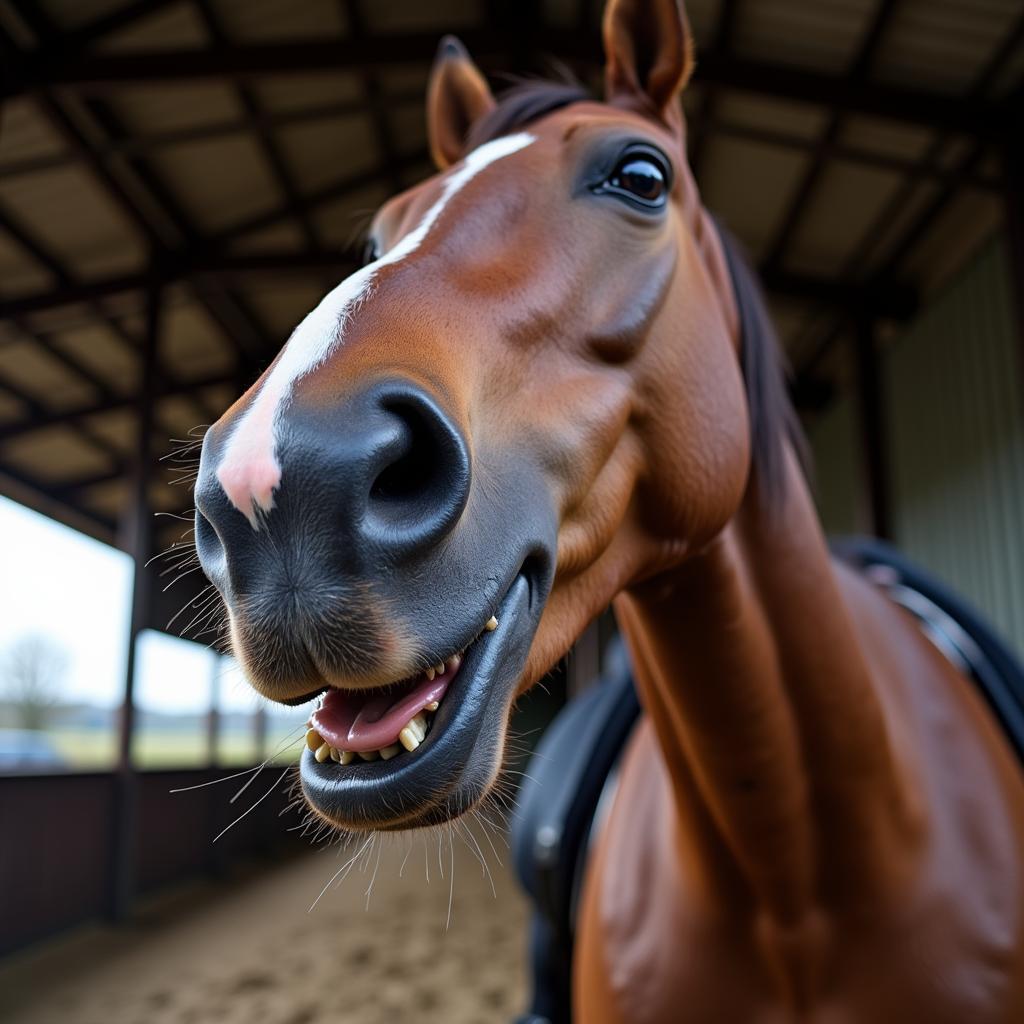Horse Pants, or the visible signs of a horse sweating, are a natural physiological response to exertion, heat, or stress. Understanding why and how horses sweat is crucial for responsible horse ownership. See pants for riding horses for more information on riding attire. From recognizing the signs of overheating to implementing effective cooling strategies, this article will provide you with the knowledge you need to keep your equine companion comfortable and healthy.
Decoding Horse Sweat: Why Do Horses Pant?
Horses, like humans, sweat to regulate their body temperature. When they exercise, their muscles generate heat. This heat needs to be dissipated to prevent overheating. Panting, often accompanied by flared nostrils and rapid breathing, is a key component of this thermoregulation process. It helps to evaporate moisture from the respiratory tract, cooling the horse from the inside out. Sometimes, you might even see a horse seemingly “panting” without heavy exertion. This could be due to stress or anxiety.
 Horse Panting After Exercise
Horse Panting After Exercise
Recognizing the Signs: Is My Horse Overheating?
Recognizing the signs of overheating is crucial for prompt intervention. Aside from panting, look for excessive sweating, rapid pulse, and lethargy. The horse’s gums might also appear darker than usual. In severe cases, a horse might stumble or collapse. If you notice any of these signs, it’s essential to take immediate action to cool the horse down. Learn more about appropriate riding attire at horse riding pants men.
What Causes Overheating in Horses?
Several factors can contribute to a horse overheating. Strenuous exercise in hot and humid weather is a primary culprit. Inadequate hydration, poor ventilation in stables, and underlying health conditions can also play a role. Even a horse’s fitness level influences its susceptibility to overheating. A less fit horse will overheat more quickly than a well-conditioned one.
Cooling Strategies: How to Help a Panting Horse
If your horse is panting heavily and showing signs of overheating, you need to act quickly. Move the horse to a shaded area and offer small amounts of cool water. horse jockey pants are designed for optimal breathability and can help in warmer weather. Use a hose or sponges to apply cool water to the horse’s neck, legs, and chest, focusing on areas with large blood vessels close to the surface. Continue this process until the horse’s breathing returns to normal and its body temperature decreases.
“Never use ice-cold water on an overheated horse,” advises Dr. Emily Carter, DVM. “The sudden temperature change can constrict blood vessels, hindering the cooling process and potentially causing shock.”
Preventing Overheating: Proactive Measures
Preventing overheating is always better than treating it. Ensure your horse has access to fresh, clean water at all times. Adjust exercise routines based on the weather, avoiding strenuous activity during the hottest parts of the day. Provide adequate ventilation in stables and trailers, and consider using fans during hot weather. You can explore comfortable and practical riding attire options at best pants for horse riding.
Horse Pants: Beyond the Basics
While panting is typically associated with heat and exertion, other factors can also cause it. Stress, anxiety, and pain can all lead to increased respiratory rate and panting. “It’s essential to consider the horse’s overall demeanor and environment,” explains renowned equine behaviorist, Dr. Sarah Mitchell. “If a horse is panting without an apparent reason, it’s crucial to consult a veterinarian to rule out any underlying medical conditions.” Check out our selection of polo pants with horses for a stylish and comfortable riding experience.
Conclusion: Keeping Your Horse Cool and Comfortable
Understanding horse pants and the reasons behind them is fundamental to responsible horse ownership. By recognizing the signs of overheating and implementing appropriate cooling strategies, you can ensure your horse’s well-being and prevent potential health complications. Remember, proactive measures and careful observation are key to keeping your equine companion happy and healthy.
FAQ:
- What is horse panting?
- Why do horses pant?
- What are the signs of an overheated horse?
- How can I cool down an overheated horse?
- How can I prevent my horse from overheating?
- Can stress cause a horse to pant?
- When should I call a vet for a panting horse?
For further assistance, contact us at Phone Number: 0772127271, Email: [email protected], or visit our address: QGM2+WX2, Vị Trung, Vị Thuỷ, Hậu Giang, Việt Nam. Our customer service team is available 24/7.